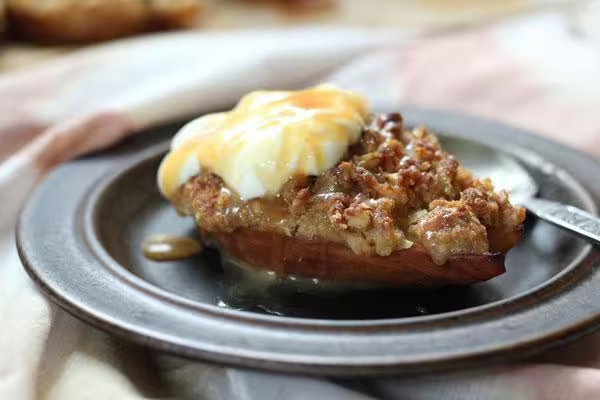
Niki Jabbour's Carrot Salad
Season 6 Episode 11 | 4m 34sVideo has Closed Captions
Winter gardening can provide a much-needed way to bring joy and color into our lives.
Watch as acclaimed gardener and author Niki Jabbour harvests carrots and parsley from her snowy garden in the middle of winter, then prepares a deliciously fresh grated carrot salad.
Problems playing video? | Closed Captioning Feedback
Problems playing video? | Closed Captioning Feedback

Niki Jabbour's Carrot Salad
Season 6 Episode 11 | 4m 34sVideo has Closed Captions
Watch as acclaimed gardener and author Niki Jabbour harvests carrots and parsley from her snowy garden in the middle of winter, then prepares a deliciously fresh grated carrot salad.
Problems playing video? | Closed Captioning Feedback
How to Watch Kitchen Vignettes
Kitchen Vignettes is available to stream on pbs.org and the free PBS App, available on iPhone, Apple TV, Android TV, Android smartphones, Amazon Fire TV, Amazon Fire Tablet, Roku, Samsung Smart TV, and Vizio.

Get More Kitchen Vignettes
Get more recipes on the Kitchen Vignettes blog. Available on PBS Food.Providing Support for PBS.org
Learn Moreabout PBS online sponsorship(gentle piano music) - [Niki] I'm Niki Jabbour and I'm a vegetable gardener from Halifax, Nova Scotia.
I'm the author of "The Year-Round Vegetable Gardener" and "Growing Under Cover," as well as two other books on growing food.
I love to be in my garden.
It's my playground, it's my refuge, and it's great to be able to grow cucumbers and tomato and basil during the growing season but to continue to harvest throughout the winter months, to me, is probably the most rewarding type of gardening that I do.
Harvesting in winter is actually pretty fun, (laughs) I gotta say.
I take a lot of satisfaction in being able to go to my garden, lift a cold frame cover, you know, dig through some straw mulch, and pull up carrots or parsnips or beets or harvest a head of lettuce or spinach.
It's very satisfying.
I love the fact that I can feed my family every day of the year even though we might have a foot of snow outside.
Summer carrots are great but a carrot in the middle of winter is just so sweet.
A lot of the starches in the roots have converted to sugar, so to me it just tastes better.
In fact, we've always called them candy carrots in our family.
These were planted back in midsummer because they take around 60 to 70 days to reach a size large enough that they'll then be mulched for over wintering.
In winter, I grow different varieties than I would for spring or summer carrots.
I'm growing varieties like Yaya or Napoli.
And there's so many varieties, so I always tell people look at their seed catalogs and read the descriptions carefully to pick the best varieties for your garden.
I've been a gardener for so many years now.
I started when I was a kid.
We always had a little family vegetable garden and it tasted so much better than what you'd buy at the supermarket or at the farmers' market sometimes.
So my interest was sparked very early and, you know, I never looked back.
I started growing the vegetables when I was around probably 10 or 11 and eventually studied horticulture, but it was an early introduction to having a family vegetable garden that made all the difference for me.
So I live in Nova Scotia, which is one of the Atlantic provinces here in Canada.
So it's a challenging climate but it doesn't mean I can't grow food.
Even if you live in a cold climate, you can use different types of season extenders.
You can use something like a bag of shredded leaves that you raked from your lawn in fall to insulate your root crops.
So if I have carrots in the garden in fall, or parsnips or beets, I will deep mulch them in late autumn before the ground freezes with straw or shredded leaves and then cover that with a row cover or an old bed sheet and that basically provides enough insulation that I can harvest all winter long.
I also use cold frames, which are essentially bottomless boxes with clear tops, and they just capture solar energy.
It's a great DIY.
You can use an old window.
There's so many different kinds of seasons extenders that you can use.
In winter, the garden really is a special place.
It's often covered in a blanket of snow and it's sparkly.
There's old beans hanging from one of my tunnels, there's some old seed heads still in the garden feeding the birds, and it just all comes together to make it a winter wonderland.
And the fact that I can pull out carrots that smell like spring, it's just amazing to me.
Today I'm making French carrot salad, which is essentially just grated carrots and fresh garden parsley, and it tastes so fresh.
So, you know, to me, it's the quintessential winter salad.
(bright piano music) This is a great basic recipe and if there's other herbs in your garden, you can add whatever you like for flavor.
So it's very adaptable to add your own ingredients.
You can add protein to it with chickpeas.
You could add some feta cheese.
There are times that I've shredded in parsnips as well because I love raw parsnips and they add an extra sweetness.
So again, you don't just have to use carrots.
You could use beets as well, make it a rainbow salad.
So don't be shy about adding new ingredients.
Support for PBS provided by:















